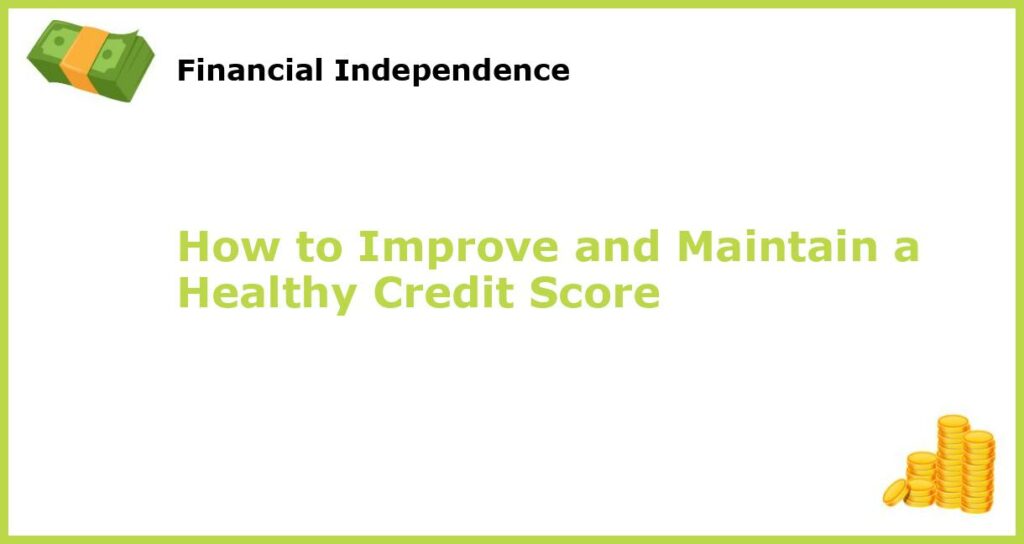Having a healthy credit score is not just important, it also has benefits. Your credit score reflects your creditworthiness, and it is used by lenders to determine your eligibility for credit and the interest rate you’ll receive. A good credit score can save thousands of dollars in interest over the course of your life, and aside from that, a good credit score provides stability and peace of mind. It can also make your life easier in many ways, such as obtaining loans, credit cards, and even an apartment lease. In this article, we will discuss the necessary steps to maintain a healthy credit score and how it can help you.
Pay Bills on Time

The most crucial factor in maintaining a healthy credit score is always paying your bills on time. Late payments can significantly lower your credit score and make it more difficult to obtain credit in the future. Therefore, prioritize your bills and make sure you pay at least the minimum amount due on time, if not earlier. If you find yourself forgetting bills, keep a calendar or a to-do list, or set reminders on your phone or computer. Whatever works for you, as long as you don’t miss any bills.
Moreover, if you’re struggling to afford something, don’t ignore your bills. Instead, communicate with your lender and explain your situation to them. They might offer payment plans or other options that can help you manage your debt and avoid a negative impact on your credit score.
Limit Credit Card Balances

While having credit card accounts can help build your credit score, carrying high balances can have a negative effect. Ideally, you should keep your balances below 30% of your available credit at all times. This shows lenders that you are responsible with your credit and able to manage your debt effectively. Therefore, limit your credit card balances, and if you can, pay off your balances in full every month. It shows that you have no trouble paying your debts on time, which will help boost your credit score.
Mix of Credit

Having a mix of credit accounts, such as both installment loans and credit cards, can also have a positive impact on your credit score. This demonstrates that you have experience managing different types of credit and can do so responsibly. But don’t go opening new credit accounts unnecessarily. Only open new accounts if you need them, and if you can keep up with the monthly payments.
Regularly Review Your Credit Report

It’s vital to regularly review your credit report to ensure that all the information is accurate and up-to-date. Any errors or inaccuracies can negatively impact your credit score. You are entitled to one free credit report per year from each of the three major credit reporting agencies. Take advantage of this, and check your credit report at least once a year. If you see any errors or inaccuracies, report them to the credit bureaus to get them fixed.
Avoid Closing Credit Accounts

While it may be tempting to close a credit account once you have paid it off, doing so can actually hurt your credit score. Whenever you close an account; it reduces the overall amount of available credit you have, which can increase your credit utilization rate and lower your score. Therefore, unless there are high annual fees or maintenance fees, don’t cancel any credit accounts. Keep them open, and they will help boost your credit score in the long run.
Keep Old Credit Accounts Open

The length of your credit history is an essential factor that lenders consider when evaluating your creditworthiness. It’s a good idea to keep old credit accounts open, even if you don’t use them. This demonstrates that you have a long credit history and can manage credit responsibly over time. Therefore, maintain all your credit accounts and credit history. It will show that you are a responsible borrower, which will make lenders trust you more and result in better terms and conditions.
Don’t Apply for Credit Too Often

Every time you apply for credit, it results in a hard inquiry on your credit report. Too many hard inquiries can negatively impact your credit score, as it can signal to lenders that you are a high-risk borrower. Therefore, don’t apply for too many credit accounts in a short period of time. Only apply for credit when you need it or when you can afford it. Any extra credit inquiries or applications can hurt your credit score.
Communicate with Lenders

If you have trouble making payments, it’s important to communicate with your lenders. Many lenders offer payment plans or other options that can help you manage your debt and avoid a negative impact on your credit score. Being honest with your lenders about your financial situation shows that you are responsible and can help you avoid additional late fees and penalties. Ignoring your lenders, on the other hand, can lead to serious consequences, such as default or even bankruptcy, which will seriously hurt your credit score.
Be Patient

Finally, improving your credit score takes time and patience. It’s important to consistently follow these tips and avoid any actions that can lower your score. Don’t expect your credit score to go up overnight, but if you keep practicing good credit habits, you’ll see your credit score improve gradually. It’s the best way to build and establish a good credit score that you can be proud of.







